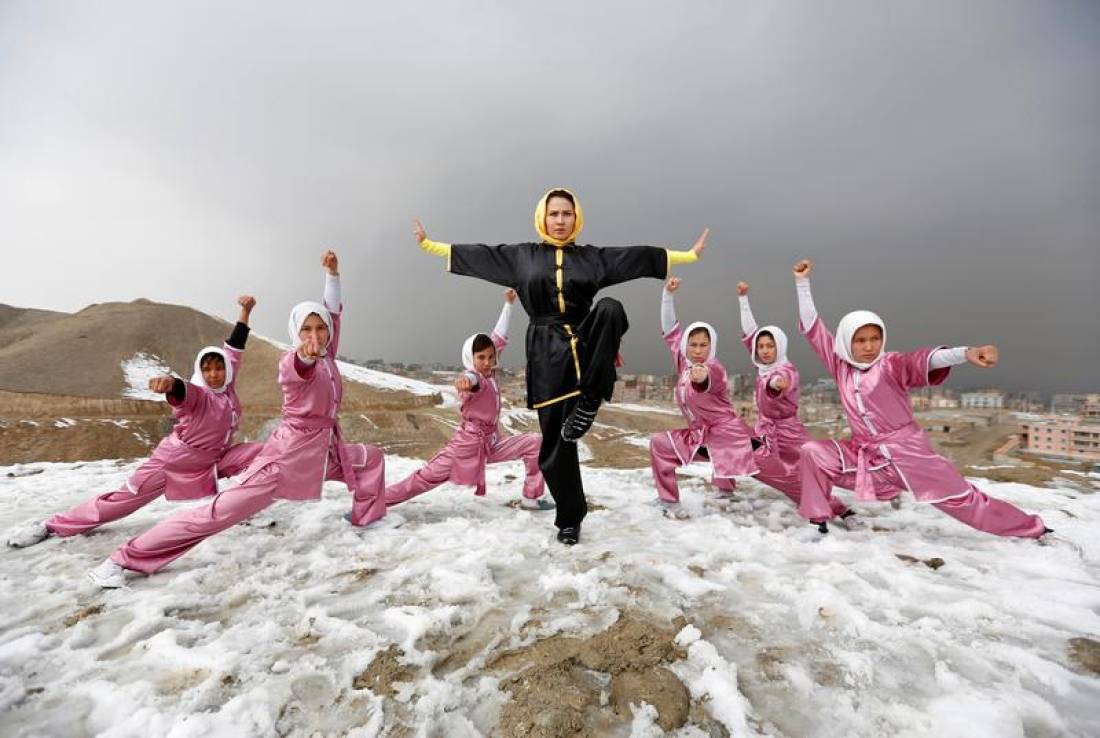WIDER IMAGE-Afghan girls fight prejudice with martial arts
news.trust.org - Girls of the Shaolin Wushu club face regular harassment and abuse in addition to the normal dangers of life in Kabul KABUL, Feb 3 (Reuters) - On a snowy mountaintop to the west of Kabul, a group of Afghan girls practise the flowing movements of Wushu, a sport developed from ancient Chinese kung fu martial arts, stretching and bending and slashing the air with bright swords.
In a country where women's sport is severely restricted, the Shaolin Wushu club in a part of Kabul that is home to the capital's Hazara ethnic community, is a rare exception.
Sima Azimi, the 20-year-old leading the practice session, says Wushu teaches self-defence, but just as important, "it's really effective for body and soul".
She learned the sport in Iran, where she won a gold and bronze medal in competition, and she has been teaching in Kabul for about a year, encouraged by her father, with whom she trains at the club's gym.
"I am working with Afghan girls to strengthen their abilities and I love to see Afghan girls improve the way other girls have improved in the world," she said.
Noorjahan Akbar: What the future holds for Afghan women
aljazeera.com - Afghanistan's women have made significant gains in recent years, with more girls attending school and more women working outside the home.
But fear still overshadows the lives of many.
A resurgent Taliban recently provoked outrage by publicly executing two women, but as this 101 East documentary shows, the greatest threat many women face comes from loved ones at home.
Activist Noorjahan Akbar talks about the challenges in overcoming conservative attitudes in the face of rising "anti-woman propaganda".
Al Jazeera: How would you describe the current state of women's rights in Afghanistan?
Noorjahan Akbar: Like the current state of the country, the current state of Afghan women is tumultuous and unstable. While - since the US-led intervention - Afghan women have made a considerable amount of progress, with [today's] increased insecurity, economic inequality, and radicalism, we are afraid that our accomplishments will be threatened, and the few civil rights and individual freedoms we have will be taken away from us.
Since 2009, the number of Afghan women working has increased, but a large number of female activists and journalists have left the country due to fear of violence.
When I talk about the threat of violence, I don't just mean the Taliban - even though they are largely responsible for targeting and killing female teachers, police officers, journalists, and activists.
On a daily basis, Afghan women face harassment in public spaces. In fact, nine out of 10 women say they have faced harassment at some point on the way to work or school, and out of those, 14 percent say they stopped going to school because of it. Eighty-seven percent of Afghan women have faced verbal, sexual or physical violence at home.
Want to receive earlybird invitations to our global events, custom-tailored content we think you'll love, and get exclusive access to "The World Women Report"?
Afghanistan’s First Female Street Artist Has Taken Over Kabul’s Walls To Glorify Its Women
For many, "graffiti" might not evoke the power that some street artists hold to spread hope, awareness and powerful message—and Afghanistan may not bring to mind messages of women's empowerment. However, one street artist—Shamsia Hassani, who lives in Kabul—is changing that. The city's walls are her canvas, and she uses her striking works of art to spread messages of peace, strength, resiliency and hope to her community.
Read more, and see more of her work, in the full article at The Huffington Post.
The Huffington Post - A woman in a purple hijab sits playing the piano, a tear rolling down her cheek. She plays her solitary tune amongst a sea of blue skyscrapers, soaring above the cars that zoom beneath her unnoticed. This subject already wears her contradictions proudly — she is strong, she is vulnerable, she is graceful, creative, separate, sad. And yet, at least it seems, she calls out to no one, content to sit with her feelings and express herself creatively, freely, in peace.
This work of street art was made by Shamsia Hassani, widely known as the first prominent woman street artist in Afghanistan. Hassani was born in 1988 in Tehran to Afghan parents, eventually moving to Kabul to pursue her bachelor’s and master’s degrees in visual art. She currently resides in Kabul, where she turns the city’s walls into colorful canvases that spread a message of peace and hope to her community.
Read more here.






